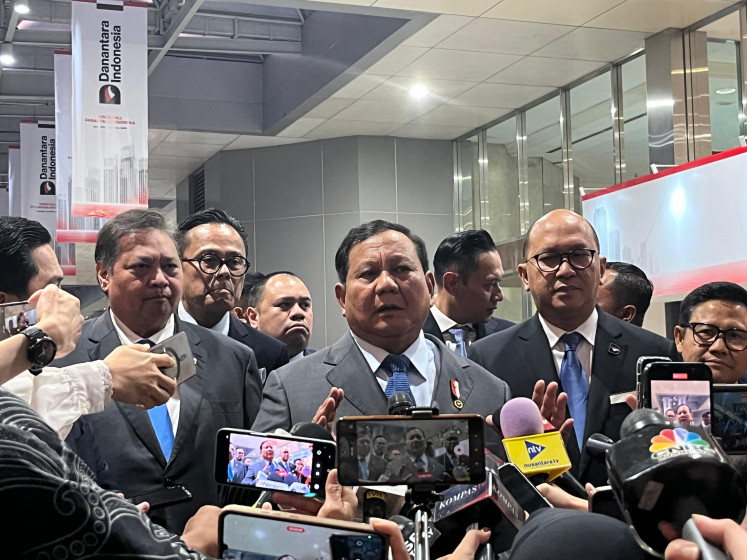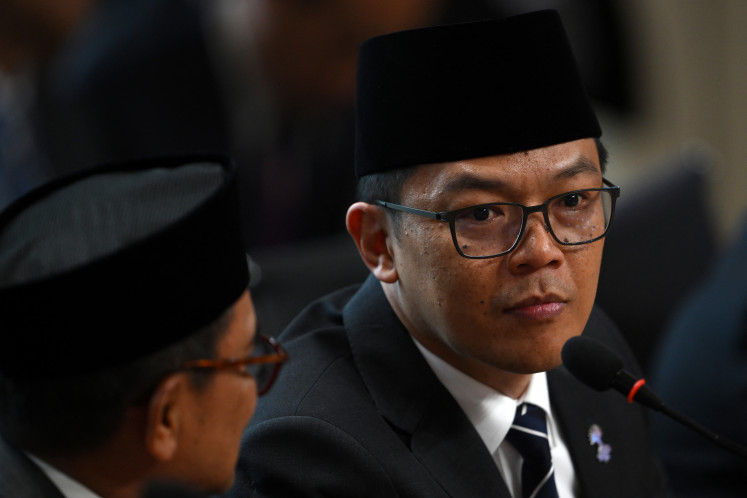Jokowi finally agrees to import rice from Thailand, Vietnam
President Joko âJokowiâ Widodo has finally agreed to import rice from Thailand and Vietnam to secure domestic stocks and maintain stable prices after previously insisting that stocks were low but enough to satisfy his commitment to self-sufficiency in the vital commodity
Change text size
Gift Premium Articles
to Anyone

P
resident Joko 'Jokowi' Widodo has finally agreed to import rice from Thailand and Vietnam to secure domestic stocks and maintain stable prices after previously insisting that stocks were low but enough to satisfy his commitment to self-sufficiency in the vital commodity.
Indonesia needs rice supplies from overseas to maintain sufficient stocks in anticipation of failed harvests due to prolonged drought caused by the El Niño weather phenomenon, according to the President.
'This is to strengthen domestic rice stocks but we can store it in Vietnam or Thailand first. If there is not much rain in the third or fourth week of October, we can pull it in here but [the amount] is not fixed yet,' Jokowi told reporters after the opening event of Trade Expo Indonesia in Jakarta on Wednesday.
Rice is a politically sensitive commodity in the world's fourth most populous nation, both because it is the main food staple of the more than 250 million people living throughout the archipelago, and because it is the main crop of farmers.
Separately on the same day, State Logistics Agency (Bulog) president director Djarot Kusumayakti, who is responsible for managing domestic rice stocks, said that current stocks had almost run out, with only 1.4 million tons remaining. The remaining stocks may only be enough to cover distribution for low-income people and emergencies in times of disaster, he added.
He revealed that the government had talked to rice producing countries, and Vietnam had agreed to provide 1 million tons of rice for Indonesia. Thailand has not yet come to an agreement.
Nevertheless, Indonesia has not agreed on how much to import from Vietnam as Bulog still has to take into account uncertain weather developments. 'There are things that have changed from our previous calculations, so this is not easy,' Djarot added.
At the end of September, Jokowi said rice stocks were 'secure enough' with 1.7 million tons of rice and another 200,000 to 300,000 tons of rice to be added into the reserve after expected harvests in October and November.
Vice President Jusuf Kalla, meanwhile, had previously stated that the government would import 1.5 million tons of rice in light of the devastating impact of El Niño, and that it was purchasing the rice from Thailand and Vietnam.
Kalla also pledged not to repeat the mistakes made by former president Soeharto in 1997 when he failed to respond to drought-induced shortages in rice production, leading to soaring rice prices and social unrest.
Jokowi noted previously that Indonesia was the world's third biggest consumer of rice after China but its rice stocks were 'very low' compared with other countries, citing China's 40 million tons of rice stock and the Philippines' 2.5 million tons of stock.
Jokowi has made it a priority for Indonesia to be self sufficient in key commodities such as rice, corn, soybean and sugar.
'The most important matter now is not whether importing is a must or not but to distribute the imported rice into the market at the right moment to avoid hurting local farmers,' Indonesian Institute of Sciences (LIPI) economist Latif Adam told The Jakarta Post.
'Don't bring in the rice during local harvest as it could pressure farmers to tighten their profit margins due to competition with foreign rice,' Latif said.
According to Latif, importing rice at the right time can prevent rice prices from soaring. Rising rice prices contribute as much as 20 percent to the inflation rate because rice is a staple food.
The latest report put out by the Meteorology, Climatology and Geophysics Agency (BMKG) on its website states that only 62 out of 342 season zones (ZOM) across the archipelago will see its rainy season begin in October, while most of the zones, or 139 out of the total, will see their rainy season begin in November. (rbk)
______________________________
To receive comprehensive and earlier access to The Jakarta Post print edition, please subscribe to our epaper through iOS' iTunes, Android's Google Play, Blackberry World or Microsoft's Windows Store. Subscription includes free daily editions of The Nation, The Star Malaysia, the Philippine Daily Inquirer and Asia News.
For print subscription, please contact our call center at (+6221) 5360014 or subscription@thejakartapost.com









